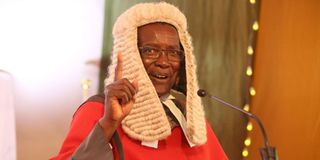I will remember Justice Maraga as a valiant modern-day giant slayer

Chief Justice David Maraga asked President Kenyatta to dissolve Parliament over its failure to enact the two-thirds gender rule law.
What you need to know:
- When he was nominated for appointment, Justice Maraga remained largely unknown.
- Across Kenya’s political divide, Maraga’s nomination was unanimously endorsed on grounds of notable harmlessness
Eric Ng’eno: I will remember Justice Maraga as a valiant modern-day giant slayer
As often happens in Kenya, one pinches herself in utter disbelief, wondering how we got here. In the beginning, it appears to have been decided that the process of vetting an in-coming Chief Justice under the new constitution would be a formidable CV festival.
A prospective top judge had to be profiled in a publicly accessible parade to vouch for acumen and integrity. Perhaps it is only a coincidence, in the sense that Dr Willy Mutunga, the first candidate to ace this process, happens to be a figure whose intellectual and political life were lived in the limelight, for better and worse.
Nonetheless, a judge’s life, is hardly ever private. At the same time, David Kenani Maraga turned out not to have been as well-known as one would expect of an advocate, appeal and superior court judge of long standing. In the beginning therefore, this anonymity worked greatly to his advantage.
It is no secret that both sides of the political divide were quite comfortable with his nomination and appointment as a compromise candidate, if other, significantly preferred candidates were too polarising.
A number of applicants had made public their commitments on controversial ideological issues, while others professed decidedly radical policy stands. Such signals are, of course, interpreted by different constituencies in myriad ways and not only profile the candidate per se, but also, secondarily affect the relative standings of their rivals.
Justice Maraga seemed to be determinedly committed to an amorphous neutrality; his every signal always resolving into a distinct avoidance of conflict and controversy. Decisive indeterminacy may have been his deliberate strategy to avoid expectations. Perhaps his real struggle was against any expectations at all.
When he was nominated for appointment, Justice Maraga remained largely unknown. He had won the battle of expectations against a political establishment keen to label state officers according to political affiliation on the most spurious of grounds. It may be said of Maraga at his appointment that expectations of him were severely low.
On the basis of purely rational political calculation, each side considered him a fairly safe bet: neither a toxic reactionary or intransigent conservative, nor an unhinged liberal or rampaging radical.
Across Kenya’s political divide, Maraga’s nomination was unanimously endorsed on grounds of notable harmlessness. And 2017 was pretty much key in evaluating the political consequences of Dr Mutunga’s successor. The equanimity with Maraga’s appointment was therefore, at its core, deeply contemptuous and perfectly consistent with the expectations of the political class that Maraga’s standing ranged from “quite useless” to “up-for-grabs,” politically speaking.
As he left office, very few remained in doubt of Maraga’s resolute independence of mind, loyalty to the institution of the judiciary and commitment to his oath of office. He publicly and systematically disabused contemptuous stakeholders, and made a lot of powerful people uncomfortable. Ordinarily confident potentates learned to dread the devastating boldness of his pronouncements.
For a man who had incredibly big shoes to fill, Maraga has not done too badly. Without Mutunga’s soaring radicalism, academic flair and pulsating charisma, he charted his own course, obstinately grounded in the ordinary, fastidiously non-ideological and fiercely implacable in his pursuit of judicial independence and the rule of law.
Unafraid to proclaim his faith, Maraga nevertheless is not a prisoner of piety. Chillingly direct and fearless, his chastisement of legislative and executive transgression never degenerated into disrespect or vulgar point-scoring. He has walked calmly where angels fear to tread.
Like the unheralded shepherd boy after whom he is named, Maraga, meagrely armed, defied ridicule to slay a couple of formidable goliaths. He nullified Uhuru Kenyatta’s election, but denied the successful petitioner full victory by declining to declare Raila Odinga the winner. As we speak, a sword of Damocles oscillates dangerously above a bound Parliament, if it doesn’t stop joking about with the constitutional gender representation threshold.
Maraga’s greatest legacy, however, has been his strong stand against a monstrously corpulent executive, ballooning on the steroids of impunity. Even if it seems to have its way, as it so often does, Maraga kept has alive the constitutional assurance that might is not right, and that legitimacy matters.
Kenyans therefore can have faith that in the fullness of time, they will be vindicated against the repressive muscularity of a corrupt executive that is intoxicated with the transactional politics of capture, abuse and discard.
In the end, Maraga was an inspired choice for Chief Justice. His stolidity and conscientiousness became subversive in the face of the shrillness, angst and melodrama all around him. This is also a verdict on the revisiting. The mighty political tantrum and impetuous retaliation now rightly appear abject, entitled and tyrannical, but Maraga’s revisiting of many unwholesome expectations has been appropriate, comprehensive and disillusioning.
Well done and baraka tele, the honourable Mr Justice David Kenani Maraga.
@EricNgeno





